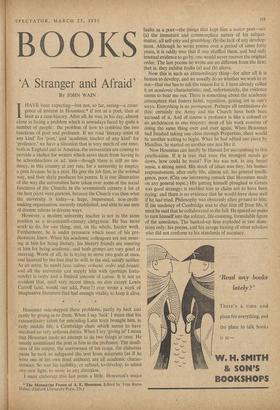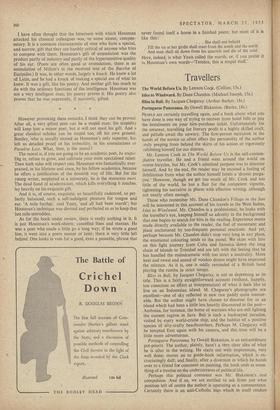BOOKS
'A Stranger and Afraid'
BY JOHN WAIN IHAVE been expecting—but not, so far, seeing—a resur- gence of interest in Housman;* if not as a poet, then at least as a case-history. After all, he was, in his day, almost alone in facing a problem which is nowadays faced by quite a number of people: the problem of how to combine the two functions of poet and professor. If we read `literary artist of any kind' for `poet,' and `academic teacher of any kind' for `professor,' we have a situation that is very much of our time; both in England and in America, the universities are coming to provide a shelter for writers which saves them from having to be schoolteachers or ad. men—though there is still no ten- dency, in.this country at any rate, for a university to employ a poet because he is a poet. He gets the job first, in the normal. way, and then shyly produces his poems. It is one illustration of the way The universities have taken over some of the social functions of the Church; in the seventeenth century a lot of the best poets were parsons, because the Church was then what the university is today—a large, impersonal, non-profit- making organisation, securely established, and able to use men of diverse talents in diverse ways.
However, a modern university teacher is not in the same position as a seventeenth-century clergyman. He has more work to do, for one thing; and, on the whole, harder work.
Furthermore, he is under pressures which none of his pre- decessors knew. When his academic colleagues are not sneer- ing at him for being literary, his literary friends are sneering at him for being academic, and both groups are very good at sneering. Worst of all, he is trying to serve two gods at once.' and haunted by the fear that he will. in the end, satisfy neither. As an artist, he needs ^ luxe, calme, volume., ordre and beaute, and all the university can supply him with (perhaps fortu- nately) is ordre and a limited amount of calme. It is not an accident that, until very recent times, ho don except Lewis Carroll (and, would one add, Pater?) ever wrote a work of imaginative literature that had enough vitality to keep it alive.
• * faults as a poet—the things that kept him a minor poet—are (a) the immature and commonplace nature of his subject- matter, all self-pity and grumbling; (b) the lack of any develop- ment. Although he wrote poems over a period of some forty years. it is oddly true that if one shuffled them. and had only internal evidence to go by, one would never recover the original order. The last poems he wrote are no different from the first; that is, they exhibit faults (a) and (b) above. Now this is such an extraordinary thing—for after all it is human to develop, and we usually do so whether we wish to or not—that one has to ask the reason for it. I have already called it an academic characteristic: and, unfortunately, the evidence seems to bear me out. There is something about the academic atmosphere that fosters habit, repetition, getting set in one's whys. Everything is so permanent. Perhaps all institutions do this; certainly the Army and the Church have both been accused of it. And of course a professor is like a colonel or an archdeacon in one respect: most of his work consists of doing the same thing over and over again. When Housman had finished taking one class through Propertius, there would be another waiting to begin. When he had edited one piece by Manilius, he started on another one just like it.
Now Housman can hardly be blamed for succumbing to this petrification. If it is true that even the strongest minds go down, how could he resist? For his was not, in any broad sense, a strong mind. His stock of ideas was tiny; his human responsiveness, after early life, almost nil; his general intelli- gence, poor. (Cite one interesting remark that Housman made on any general topic.) His getting himself ploughed in Greats was good strategy; it enabled him to claim not to have been trying; and there is no evidence that he would have done well if he had tried. Philosophy was obviously alien ground to him. If the tendency of Cambridge was to shut him off from life, it I have often thought that the bitterness with which Housman attacked his classical colleagues was, to some extent, compen- satory. It is a common characteristic of men who have a special, and narrow, gift that -they are harshly critical of anyone who tries to compete with them. Housman's gift of emendation was the product partly of industry and partly of the hypersensitive quality of his ear. (Poets are often good at emendation; there is an emendation of Milton's in the received text of the Bacclue of Euripides.) It was, in other words, largely a knack. He knew a lot of Latin, and he had a knack of making a special use of what he knew. It was a gift, like his poetry. And neither gift has much to do with the ordinary functions of the intelligence. Housman was not a very intelligent man; his poetry proves it. His poetry also proves that he was supremely, if narrowly, gifted.
However provoking these remarks, I think they can be proved. After all, a very gifted poet can be a stupid man; his stupidity will keep him a minor poet, but it will not spoil his gift. And a great classical scholar can be stupid too, off his own ground. Bentley, who is usually named as Housman's only superior, has left us detailed proof of his imbecility, in his emendations of Paradise Lost. What, then, is the moral?
The moral is, if you are going to be an academic poet, be stupid Dig in, refuse to grow, and cultivate your most specialised talent Then both sides will respect you. Housman was fantastically over praised, in his lifetime and since, by his fellow academics, because he offers a justification of the donnish way of life. But for the young writer, employed at a university, he is the memento marl The dead hand of academicism, which kills everything it touches.
lay heavily on his exquisite gift. •
And it is, of course, exquisite; so beautifully cadenced, so per. fectly balanced, such a self-indulgent pleasure for tongue and ear. 'A mile further,' said Yeats, 'and all had been marsh'; but Hciusman's technique was devised and perfected so as to keep that last mile untrodden.
As for the book under review, there is really nothing in it. It is just Housman's work-sheets; cancelled lines and stanzas. He was a poet who made a little go a long way; if he wrote a good line, it went into a poem sooner or later; there is very little left behind. One looks in vain for a good, even a passable, phrase that
never found itself a home in a finished poem; but most of it is like this: . . . She shall not behold
Till the ice at her girdle shall meet from the south and the north And man shall sit down from his quarrels and die of the cold.
Here, indeed, is what Yeats called the marsh; or, if you prefer it in. Housman's own words—Terence, this is stupid stuff.'



































 Previous page
Previous page